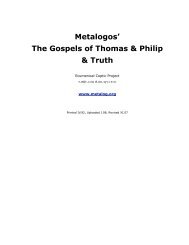Andrew Louth - Syriac Christian Church
Andrew Louth - Syriac Christian Church
Andrew Louth - Syriac Christian Church
Create successful ePaper yourself
Turn your PDF publications into a flip-book with our unique Google optimized e-Paper software.
3<br />
MAXIMUS’ SPIRITUAL THEOLOGY<br />
We have already seen that, so far as his writings go, Maximus seems<br />
to have begun by addressing himself to matters of spiritual or ascetical<br />
theology. Before his arrival in Africa, round about 630, few of his<br />
writings raise questions of dogmatic or philosophical theology, though<br />
if it is indeed the case, as has been conjectured, that on his way from<br />
Asia Minor to Africa he engaged in disputation with Severan<br />
Monophysites in Crete, it would seem that he already had a<br />
reputation as a defender of Orthodoxy. I have already argued that it is<br />
probably not fortuitous that his concerns were initially ascetic. It is, it<br />
seems to me, of a piece with the way in which his theological writings<br />
are essentially occasional, the response to requests for elucidation on<br />
the part of his friends. He early acquired a reputation as a spiritual<br />
father (though it seems that he never became an abbot, still less a<br />
priest), and it was out of that relationship that he began to write both<br />
letters and short treatises many of which follow closely the forms of<br />
monastic catechesis.<br />
A THEOLOGICAL ASCESIS<br />
But from the beginning his ascetical theology is firmly set against a<br />
theological background: ascetical theology is about how we come to<br />
know God, it is not about some kind of spiritual technique; to come to<br />
know God is a matter of experience, not speculation; for a <strong>Christian</strong> to<br />
come to know God is to respond to a God who has made himself<br />
known. This is where Maximus begins. Early on in his short treatise<br />
on the Lord’s Prayer (written before 630) we read:<br />
The Logos bestows adoption on us when He grants us that<br />
birth and deification which, transcending nature, comes by grace<br />
from above through the Spirit. The guarding and preservation of<br />
this in God depends on the resolve of those thus born: on their<br />
sincere acceptance of the grace bestowed on them and, through




